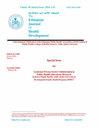COVID-19大流行期间哈萨克斯坦医学生的利他行为、个人和心理健康
IF 0.4
4区 医学
Q4 PUBLIC, ENVIRONMENTAL & OCCUPATIONAL HEALTH
Ethiopian Journal of Health Development
Pub Date : 2021-01-01
DOI:10.32921/2225-9929-2021-4-44-42-49
引用次数: 0
摘要
背景/目的。由于新冠肺炎大流行的严峻形势,来自世界各地的医学生都参与了抗击新病毒的斗争。本研究旨在探讨利他行为背景下新冠肺炎疫情对医学生生活质量的影响。共有437名来自阿斯塔纳医科大学和哈萨克斯坦-俄罗斯医科大学的医科学生参加了横断面研究。利他行为被评估到参与者表现出某种利他行为的程度。为了评估COVID-19的直接心理影响,我们进行了一项在线调查,使用了COVID-19恐惧量表、抑郁、焦虑和压力量表、个人幸福指数(PWI)和学习动机量表。结果。女生PWI水平较低,对新冠肺炎的恐惧程度较高。抑郁、焦虑和压力的患病率分别为14.4%、18.1%和6.6%,并与对COVID-19的恐惧相关。确诊COVID-19的学生、有家人或朋友确诊COVID-19的学生,以及与高危人群一起生活的学生,个人和心理健康状况不佳的风险很高。COVID-19期间的利他行为与高PWI相关。志愿服务和提供医疗服务的学生表现出更高的个人和心理健康水平,以及对该职业的满意度。但是,在临时医院工作与压力症状相关。尽管新冠肺炎疫情带来负面影响,但医学生的利他行为对其生活质量产生了积极影响本文章由计算机程序翻译,如有差异,请以英文原文为准。
Altruistic behavior, personal and psychological well-being of medical students during the COVID-19 pandemic in Kazakhstan
Background/Aim. Due to the dire situation surrounding the COVID-19 pandemic, medical students from all over the world have been involved in the fight against the new virus. We aimed to study the impact of the COVID-19 pandemic on the medical students’ quality of life in the context of altruistic behavior.Methods. In total, 437 medical students from Astana Medical University and Kazakh-Russian Medical University participated in a cross-sectional study. Altruistic behavior was assessed to what extent the participants showed certain acts of altruism. To evaluate the immediate psychological impact of COVID-19, we conducted an online survey, using the Fear of COVID-19 Scale, the Depression, Anxiety and Stress Scale, Personal Well-being Index (PWI), and Academic Motivation Scale. Results. Female students showed a lower level of PWI and a higher level of Fear of COVID-19. The prevalence of depression, anxiety, and stress was 14.4%, 18.1%, and 6.6%, respectively, and was correlated with Fear of COVID-19. Students with confirmed COVID-19, students with family members or friends with confirmed COVID-19, and students who lived with high-risk people had a high risk for low personal and psychological well-being. Altruistic behavior during the COVID-19 was associated with high PWI. Volunteering and providing medical care students demonstrated a higher level of personal and psychological well-being, and satisfaction with the profession. But, working in provisional hospitals was associated with symptoms of stress.Conclusion. Despite the negative impact of the COVID-19, altruistic behavior had a positive impact on medical students ‘quality of life
求助全文
通过发布文献求助,成功后即可免费获取论文全文。
去求助
来源期刊

Ethiopian Journal of Health Development
PUBLIC, ENVIRONMENTAL & OCCUPATIONAL HEALTH-
CiteScore
0.80
自引率
0.00%
发文量
0
审稿时长
>12 weeks
期刊介绍:
The Ethiopian Journal of Health Development is a multi and interdisciplinary platform that provides space for public health experts in academics, policy and programs to share empirical evidence to contribute to health development agenda.
We publish original research articles, reviews, brief communications and commentaries on public health issues, to inform current research, policy and practice in all areas of common interest to the scholars in the field of public health, social sciences and humanities, health practitioners and policy makers. The journal publishes material relevant to any aspect of public health from a wide range of fields: epidemiology, environmental health, health economics, reproductive health, behavioral sciences, nutrition, psychiatry, social pharmacy, medical anthropology, medical sociology, clinical psychology and wide arrays of social sciences and humanities.
The journal publishes the following types of contribution:
1) Peer-reviewed original research articles and critical or analytical reviews in any area of social public health. These papers may be up to 3,500 words excluding abstract, tables, and references. Papers below this limit are preferred.
2) Peer-reviewed short reports of research findings on topical issues or published articles of between 2000 and 4000 words.
3) Brief communications, and commentaries debating on particular areas of focus, and published alongside, selected articles.
4) Special Issues bringing together collections of papers on a particular theme, and usually guest edited.
5) Editorial that flags critical issues of public health debate for policy, program and scientific consumption or further debate
 求助内容:
求助内容: 应助结果提醒方式:
应助结果提醒方式:


